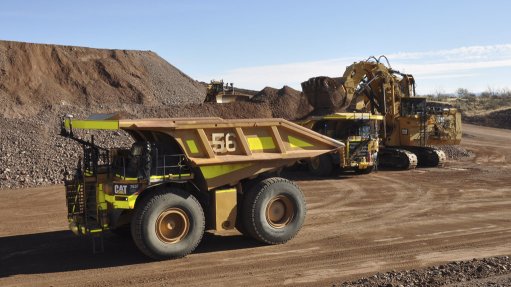Employers must invest in climate-proofing workers and communities
This article has been supplied.
A multipronged approach to minimising the risks of a warming world, with vulnerable humankind at its centre has never been more urgent, writes Rhys Davies
Some crises can seem so overwhelming in their scale that we become desensitised to them and they lose their sense of urgency. Sometimes that’s due to lack of progress on combatting the problem, or the sense that it’s not seen as urgent.
Climate change is one such issue: This month (SUBS: May 2024), in a survey of the world's top climate scientists, nearly 80% see global temperatures breaching the internationally agreed safer upper limit of 1.5 degrees C. All the respondents are from the authoritative Intergovernmental Panel on Climate Change (IPCC). Most conclude that global temperatures will reach at least 2.5 degrees C and envisage a future in which humankind faces famines, wildfires, floods and other extreme weather events on a scale our species or planet has never seen. That in turn will drive conflicts over resources – water, arable land – and surges in climate refugees.
A study by the Potsdam Institute for Climate Impact Research (PIK) examined 3m computer simulations of interactions between a number of major natural factors affecting our climate, including the Greenland icecap, the Amazon rainforest, permafrost, Arctic winter sea-ice, annual monsoons, and the Atlantic Gulf Stream. The failure of one or more of these could trigger a domino effect of the others, with irreversible and accelerated impacts. The researchers debated the extent to which the collapse of at least five of these systems is underway.
So far, so bleak. But what has all this to do with an automaker? The short answer: everything. As South Africans, business professionals and humans, not acting is not an option. We’ve don’t have the luxury of being passive, and nobody is coming to save us.
All of the following must be brought to bear if we’re to stand any chance of averting the worst impacts of climate change:
- Invest in decarbonisation: The Global Electricity Review published by energy thinktank Ember says rapid growth in solar and wind has brought the world to a crucial turning point — probably this year — at which global fossil-fuel generation will start to decline: renewables generated a third of global energy output for the first time in 2023. Business must support this. One example of what’s already in place is Ford’s solar array at the Silverton plant, with more than 30 000 panels supplying 35% of the facility’s power. It constitutes the completion of the first phase of Ford SA’s Project Blue Oval, with the next phases being evaluated to become energy self-sufficient and carbon neutral. It’s one of the world’s biggest solar carports and aligns with Ford’s global strategy of 100% carbon-free electricity by 2035 and complete carbon neutrality by 2050. The facility benefits our operations and customers in the more than 100 markets to which we export vehicles. It was the first project of its kind to provide large-scale renewable energy to the automotive sector.
- Invest in communities: Numerous studies have shown that climate change is already disproportionately affecting the poor, who have fewer choices to avoid its impacts, while also having the smallest carbon footprint. Social development of vulnerable communities is crucial for climate-proofing them. Every breadwinner, family and community that is empowered to break a cycle of generational poverty helps reduce the impact of climate change by tiny increments. And that’s never been more urgent for humankind and for Africa. A McKinsey report on the impacts of climate change on Africa’s crucial agriculture sector found that it could destabilize local markets, curb economic growth, and heighten risk for agricultural investors. It’s already driving spikes in the costs of many foods, again hurting the poor first.
- Face the facts: As automakers, we must acknowledge that the global transition to a future of all-electric or alternative-fuel vehicles won’t be easy or quick. But we’re also sure that over time, offering customers choices of EVs, ICEs (Vehicles powered by Internal Combustion Engines) and hybrids – such as Ford’s PHEV Ranger (Plug-in hybrid-electric vehicle – built in South Africa) will drive its inevitability. Ford’s strategy to offer all-electric fleet vehicles in Europe by 2035 is unchanged and is bolstered by our commitment to introduce new passenger and commercial EVs to Europe by 2024.
Lastly, we must be serious about the issue. It’s the defining, existential crisis of our time. There’s no longer room for entertaining contrarian climate denial, nor playing down its impacts. That luxury simply no longer exists.
Rhys Davies is Operations Director at Ford Motor Company of South Africa
Article Enquiry
Email Article
Save Article
Feedback
To advertise email advertising@creamermedia.co.za or click here
Comments
Announcements
What's On
Subscribe to improve your user experience...
Option 1 (equivalent of R125 a month):
Receive a weekly copy of Creamer Media's Engineering News & Mining Weekly magazine
(print copy for those in South Africa and e-magazine for those outside of South Africa)
Receive daily email newsletters
Access to full search results
Access archive of magazine back copies
Access to Projects in Progress
Access to ONE Research Report of your choice in PDF format
Option 2 (equivalent of R375 a month):
All benefits from Option 1
PLUS
Access to Creamer Media's Research Channel Africa for ALL Research Reports, in PDF format, on various industrial and mining sectors
including Electricity; Water; Energy Transition; Hydrogen; Roads, Rail and Ports; Coal; Gold; Platinum; Battery Metals; etc.
Already a subscriber?
Forgotten your password?
Receive weekly copy of Creamer Media's Engineering News & Mining Weekly magazine (print copy for those in South Africa and e-magazine for those outside of South Africa)
➕
Recieve daily email newsletters
➕
Access to full search results
➕
Access archive of magazine back copies
➕
Access to Projects in Progress
➕
Access to ONE Research Report of your choice in PDF format
RESEARCH CHANNEL AFRICA
R4500 (equivalent of R375 a month)
SUBSCRIBEAll benefits from Option 1
➕
Access to Creamer Media's Research Channel Africa for ALL Research Reports on various industrial and mining sectors, in PDF format, including on:
Electricity
➕
Water
➕
Energy Transition
➕
Hydrogen
➕
Roads, Rail and Ports
➕
Coal
➕
Gold
➕
Platinum
➕
Battery Metals
➕
etc.
Receive all benefits from Option 1 or Option 2 delivered to numerous people at your company
➕
Multiple User names and Passwords for simultaneous log-ins
➕
Intranet integration access to all in your organisation




















